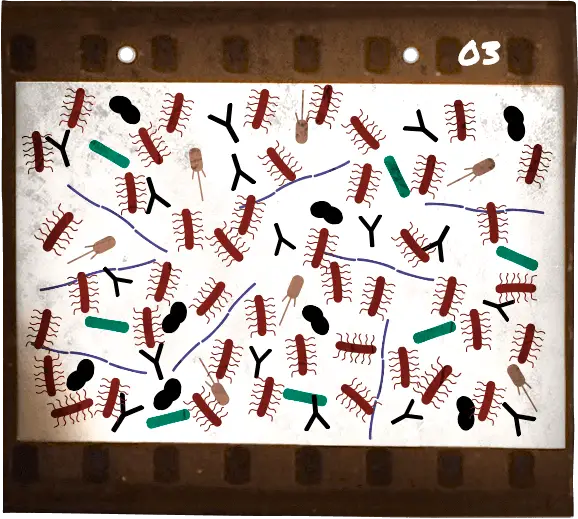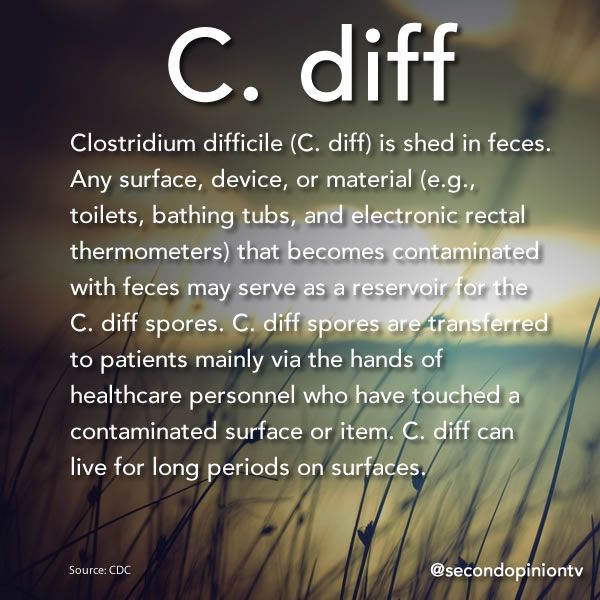The Use Of Probiotics To Prevent Clostridium Difficile Diarrhea Associated With Antibiotic Use
What is Clostridium difficile-associated diarrhea?
Antibiotics are among the most prescribed medications worldwide. Antibiotic treatment may disturb the balance of organisms that normally populate the gut. This can result in a range of symptoms, most notably, diarrhea. Clostridium difficile is a particularly dangerous organism that may colonize the gut if the normal healthy balance has been disturbed. Clostridium difficile-related disease varies from asymptomatic infection, diarrhea, colitis, and pseudo-membranous colitis to toxic megacolon and death. The cost of treatment is expensive and the financial burden on the medical system is substantial.
What are probiotics?
Probiotics are live organisms . thought to improve the balance of organisms that populate the gut, counteracting potential disturbances to the gut microbial balance that are associated with antibiotic use, and reducing the risk of colonization by pathogenic bacteria. Probiotics can be found in dietary supplements or yogurts and are becoming increasingly available as capsules sold in health food stores and supermarkets. As functional food or good bacteria, probiotics have been suggested as a means of both preventing and treating C. difficile-associated diarrhea .
What did the researchers investigate?
What did the researchers find?
To assess the efficacy and safety of probiotics for preventing C.difficile-associated diarrhea in adults and children.
What Did Researchers Find About Probiotics
The chart below lists some different types of probiotics and what researchers found about each.
Findings About Probiotics| What did researchers find? | |
|---|---|
| Saccharomyces boulardii | Does not appear to help keep CDI from coming back when added to treatment with an antibiotic, but more research is needed to know this for sure. |
| Lactobacillus | Appears to help keep CDI from coming back when added to treatment with an antibiotic, but more research is needed to know this for sure. |
| A combination of two or more types of probiotics | Appears to help keep CDI from coming back when added to treatment with an antibiotic, but more research is needed to know this for sure. |
What Causes C Diff Infections
C. diff bacteria are commonly found in the environment, but people usually only get C. diff infections when they are taking antibiotics. Thatâs because antibiotics not only wipe out bad germs, but they also kill the good germs that protect your body against infections. The effect of antibiotics can last as long as several months. If you come in contact with C. diff germs during this time, you can get sick. You are more likely to get a C. diff infection if you take antibiotics for more than a week.
C. diff spreads when people touch food, surfaces, or objects that are contaminated with feces from a person who has C. diff.
Also Check: How Long Are Antibiotics For Uti
Why Is Bezlotoxumab Used
After an infection of C. diff is treated, symptoms may come back weeks or months later. This may happen because the first treatment did not fully cure the infection. Or it may happen because you were infected again with C. diff. Getting C. diff infection a second time is more likely if you are in places where C. diff spreads more easily, such as a hospital or long-term care facility. It can happen if your immune system is not working normally. This may be the case if you have a disease that affects the immune system or if you are an older adult. Or you may be taking medicine to lessen the response of your immune system. Repeat cases of C. diff can also occur if you take antibiotics again. Bezlotoxumab has been shown to lower the risk of recurrent C. diff by about 10%. It is expensive. Check with your insurance company to see what your coverage is for this medicine.
What Can Be Done To Prevent Clostridioides Difficile Infection

To prevent Clostridioides difficile infection, hospitals and nursing homes take the following precautions:
- Ask the patient to clean their hands after using the bathroom.
- Make sure all healthcare providers clean their hands before and after caring for every patient.
- Use a disinfectant to clean rooms and equipment.
- Give patients antibiotics only when necessary.
- Alert any facility to which a Clostridioides difficile patient may be transferred.
When caring for patients with Clostridioides difficile hospitals and nursing homes will:
- Place patients with Clostridioides difficile infection in a private room whenever possible.
- Place the patient in Contact Precautions, also known as isolation. Healthcare providers wear gloves and a gown over their clothing when entering the room and wash their hands with soap and water when leaving the room.
- Have patients with Clostridioides difficile infection remain in their room unless they need to leave for medically necessary treatments or therapies.
- Ask visitors, or anyone entering the room, to clean their hands when they come in and before they leave the room.
Hospitals and nursing homes may also ask the patients visitors to:
- Wear gloves and a gown especially if they are helping to provide care.
- Not eat or drink in the patients room.
- Not use the patients bathroom.
Also Check: Alternatives To Antibiotics For Sinus Infection
How Do People Get C Diff Infections
C. diff germs are found in feces, which is why good handwashing is so important after using the bathroom. People can become infected if they touch items or surfaces that are dirty with C. diff germs and then touch their mouth. These germs can live outside the body for a long time.
C. diff infection most often happens in people who have recently taken antibiotics and have had recent admissions to a health care facility, such as a hospital or nursing home. However, it is becoming more common for people to get C. diff infection without having a recent hospitalization or nursing home stay. These infections are called community-associated C. diff infections. These people often have recently taken antibiotics.
Be Smart About Antibiotics
Most cases of C. diff occur in patients taking antibiotics. Good use of antibiotics can help prevent the spread of C. diff.
- Antibiotics only work on bacteria they will not treat an illness caused by a virus, like the flu or a cold.
- Trust your providerâs recommendation on if you need an antibiotic do not demand an antibiotic prescription.
- Never share antibiotics with others.
- If your provider prescribes you antibiotics, always finish the entire prescription unless your provider tells you to stop.
- Do not save antibiotics for later use.
- If you develop diarrhea while taking antibiotics, contact your health care provider.
Also Check: How Long Does It Take For Antibiotics To Help Uti
Read Also: Can I Get Antibiotics Without A Doctor Prescription
How You Get Clostridium Difficile
C. diff bacteria are found in the digestive system of about 1 in every 30 healthy adults.
The bacteria often live harmlessly because other bacteria normally found in the bowel keep it under control.
But some antibiotics can interfere with the balance of bacteria in the bowel, which can cause the C. diff bacteria to multiply and produce toxins that make the person ill.
When this happens, C. diff can spread easily to other people because the bacteria are passed out of the body in the personâs diarrhoea.
Once out of the body, the bacteria turn into resistant cells called spores.
These can survive for long periods on hands, surfaces , objects and clothing unless theyâre thoroughly cleaned, and can infect someone else if they get into their mouth.
Someone with a C. diff infection is generally considered to be infectious until at least 48 hours after their symptoms have cleared up.
You May Like: How To Get Over Tonsillitis Without Antibiotics
What Puts A Person At Risk Of Getting C Difficile Infection
People in healthcare settings are most at risk of acquiring this type of infection because C. difficile is often a healthcare-associated infection. These types of infections can be transmitted within a hospital when infection prevention and control measures are not followed.
Those at higher risk include the elderly, people with severe underlying illness, and people taking certain antibiotics or cancer chemotherapy. In addition, patients taking stomach ulcer drugs, known as proton pump inhibitors, are at increased risk for contracting C. difficile infection.
You May Like: Do Antibiotics Cause Erectile Dysfunction
Treatments For A C Diff Infection
If a doctor thinks you have a C. diff infection, they may ask for a sample of your poo to be tested.
The infection can sometimes be treated at home, or you might need to go into hospital. This is because C. diff infections can sometimes lead to more serious problems like .
A C. diff infection is treated by:
- stopping any antibiotics you’re taking, if possible
- taking a 10-day course of another antibiotic that can treat the C. diff infection
You’ll also be given advice about how to avoid dehydration, such as making sure you drink plenty of water.
Your symptoms should improve a few days after starting the new course of antibiotics. But it may be 1 to 2 weeks before the infection clears up completely.
Go back to see the GP if your symptoms get worse, you feel very unwell after starting the antibiotics, or your symptoms come back afterwards.
If your symptoms return, treatment may need to be repeated.
If the C. diff infection comes back 2 or more times, you may be offered a faecal microbiota transplant. This is where bacteria from a healthy person’s poo is put into your gut to help stop the infection.
Environmental Cleaning And Disinfection
- CDI patient rooms and patient care equipment must be cleaned prior to disinfection
- Rooms should be cleaned and disinfected starting with cleanest areas and ending with the dirtiest and from high areas to low areas
- Use a hospital-grade cleaner and Environmental Protection Agency -registered sporicidal disinfectant in accordance with label instructions
- List of EPA registered products effective against Clostridioides difficile spores.
Don’t Miss: Can Cats Take Human Antibiotics
The Strategy Of Using Different Tests
Every hospital will have a preferred diagnostic strategy for detecting C. difficile. Discuss with your infectious disease colleagues which assay your hospital uses and the best strategy for its application. Some common algorithms are as follows:
- Accept only unformed stool for testing . Then use the PCR to test for C. difficile toxin A or B. If positive, assume that the patient has clinical C. difficile and treat as such.
- Start with glutamate dehydrogenase or PCR, as a screening test. If positive, then use an ELISA assay to detect toxins as a confirmatory test.
When Can I Return To Work After C Diff Infection

- You can return to work as soon as you feel ready, or after your diarrhea has stopped.
- Healthcare workers should wait 24 to 48 hours after their diarrhea stops before returning to work or until stooling has returned to normal consistency for individuals with IBS, IBD or colostomies or ileostomies.
- Remember to wash your hands frequently, and always after using the bathroom and before eating.
Don’t Miss: Fighting Ear Infection Without Antibiotics
Why Is C Diff So Dangerous C Diff Awareness Month
C. diff is an infection caused by Clostridioides difficile, a bacterium that causes diarrhea and inflammation of the colon, called colitis. It used to be called Clostridium difficile. C. diff infections affect almost a half a million people in the U.S. every year. And, if you have C. diff, you have a higher chance 1 in 6 of getting it again within a few weeks.
What Causes Antibiotic Resistance
When a person takes an antibiotic, the drug kills bacteria, but a few can survive. These surviving bacteria are resistant to that antibiotic. They then multiply. This means that every time a patient takes an antibiotic, he or she is creating more drug-resistant bacteria. Although bacterial antibiotic resistance is an evolutionary process, societal factors also contribute to the problem. The inappropriate use of antibiotics contributes to the growing number of antibiotic-resistant bacteria today. For years, antibiotics have been prescribed for colds, earaches, flu, and other infections that normally clear up on their own. Inappropriate use of antibiotics, such as not taking doses as prescribed or taking antibiotics for viral infections, can also contribute to the emergence of antibiotic-resistant bacteria.
In recent years, antibacterial household products have become common in household cleaners, soaps, detergents, hand lotions, tooth brushes, and sometimes even plastic containers and mattresses. Although people buy these products with the intent of protecting their family from harmful germs, the widespread use of antibacterial products helps to produce resistant bacteria. As with antibiotic medications, it is important to be cautious when using these products.
Recommended Reading: Ulcerative Colitis And Antibiotics To Avoid
Questions To Ask Your Doctor
- Should I stop taking my antibiotic? At what point?
- If I have diarrhea, when should I call my doctor?
- How did I get a C. diff. infection?
- What treatment is best for me?
- If Ive had C. diff once, what is my risk of getting it again?
- My mother is in a nursing home that has a breakout of C. diff. Should she be tested?
- Ive been diagnosed as a C. diff. carrier. What precautions should I take with my friends and family?
- I have diverticulitis. Am I at risk for a C. diff. infection?
Children In Day Care/child Care:
Infected children should stay home from day care until 24 hours after diarrhea has stopped.
- You do not need to notify parents, other teachers, or the health department about a child who has C. diff.
- Infected children can use public restrooms.
- Children should always wash hands carefully with soap and water after using the restroom. Young children may need help with handwashing to prevent spread of the infection.
Don’t Miss: Can Antibiotics Cause Thrush In Mouth
New Recurrent C Diff Treatments Being Researched
Summit Pharmaceuticals is evaluating an investigational drug called Ridinilazole to determine its safety and efficacy in treating Clostridioides difficile and to help reduce the risk of C. diff coming back. Ridinilazole is designed specifically to target the C. diff bacteria, which could potentially mean less damage to the gut and a reduced chance of another infection.
If youre ready to help researchers put a stop to repeat C. diff infections, .
Trademarks are the property of their respective owners.
The link has been copied!
Dont Miss: What Is The Best Over The Counter Antibiotic
Protocol And Usage Guide
The CD Herbal Detox Kit is especially formulated for gut infection support. Along with the kit you also get a detailed protocol and usage guide in Adobe PDF format. This guide will give you all the details you need to use the CD Herbal Detox Kit, including doses, precautions, instructions for children and the elderly, list of ingredients and answers to frequently asked questions. The guide can be printed or saved to your PC or mobile device.
Read Also: Non Penicillin Antibiotics For Dental Infections
How Can I Prevent A Mrsa Infection
The best way to prevent MRSA infections is to practice good hygiene. Washing hands frequently with soap and water is a great way to prevent an infection. Avoiding contact with other peoples wounds or bandages limiting the share of personal items like towels, sheets, razors, and athletic equipment and restricting the share of lip balms, lotions, or cosmetics are best practices to stop the spread of MRSA and other staph infections. In patients struggling with drug addiction, it is important to provide information on safe injection practices, wound care, and how to recognize signs of staph infection can curb the spread of bacteria.
Predictors Of Severe Outcomes In Ibd And Ulcerative Colitis

Patients with IBD are well known to be at an increased risk for CDI. A study identified 3 independent predictors for severe outcomes in hospitalized IBD patients with CDI: serum albumin less than 3 g/dL, hemoglobin level below 9 g/dL, and elevated serum creatinine above 1.5 mg/dL.
In another study, investigators found that CDI is associated with a worse long-term outcome in patients with ulcerative colitis. In the year following treatment for CDI in these patients, an escalation in medical management was noted. In addition, independent predictors for colectomy within 1 year were infection with C difficile and endoscopically proven severe disease.
Also Check: Prophylactic Antibiotics For Sickle Cell Disease
Infusion Therapy Treatment For C Diff Infection
Clostridium difficile, more commonly referred to as C. diff, is a type of bacteria that can cause serious infections and illness in the gastrointestinal system. Most frequently, the development of C. diff occurs after prolonged antibiotic treatment especially among the elderly and those with weakened immune systems. In mild cases of C. diff, patients may only experience diarrhea for a few days and some abdominal cramping. In severe cases, however, these symptoms are more intense and can also include:
C. diff. can be a serious condition to overcome, but treatments like infusion therapy can help.
What Antibiotics Cause C Diff
Certain types of antibiotics are more strongly associated with a C. diff infection. Broad-spectrum antibiotics carry a higher level of risk, notes Dr. Allan. These antibiotics wipe out more of the native bacteria that help protect you.
Examples of antibiotics most likely to cause C. diff include:
Your risk of C. diff also increases if youre on antibiotics for more than a week, says Dr. Allan. Long-term antibiotic use is common in hospitals and nursing homes. People may also take longer courses of antibiotics for illnesses like chronic sinus infections, prostatitis and skin conditions like acne and rosacea.
Don’t Miss: Urinary Tract Infection Women Antibiotics